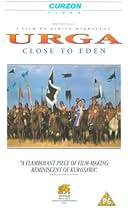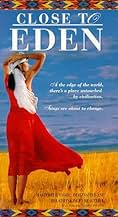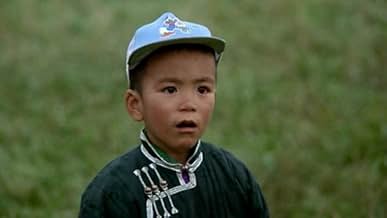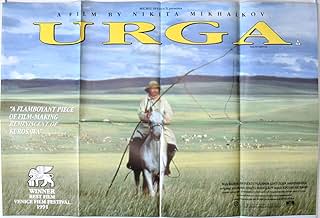Agrega una trama en tu idiomaA curious friendship develops between Gombo, a young Mongolian shepherd living with his wife and family in a hut, deep in the wilderness of the steppes, and Sergei, a Russian worker whose tr... Leer todoA curious friendship develops between Gombo, a young Mongolian shepherd living with his wife and family in a hut, deep in the wilderness of the steppes, and Sergei, a Russian worker whose truck breaks down not far from Gombo's hut.A curious friendship develops between Gombo, a young Mongolian shepherd living with his wife and family in a hut, deep in the wilderness of the steppes, and Sergei, a Russian worker whose truck breaks down not far from Gombo's hut.
- Dirección
- Guionistas
- Elenco
- Nominado a 1 premio Óscar
- 5 premios ganados y 12 nominaciones en total
Nikolay Vashchilin
- Nikolai
- (as Nikolai Vachtchiline)
Larisa Kuznetsova
- Marina
- (as Larisa Kuwnetsova)
Nikita Mikhalkov
- Bicycle rider
- (sin créditos)
Opiniones destacadas
The best definition I can give to movies I greatly admire is that they take me someplace I don't expect to go.
It can be a special location. It can be a special moment. It can be a special revelation.
Close to Eden, as this movie has been titled in the United States, offers the entire combination. A 1992 Russian nominee for the Oscar for Best Foreign Language Film, the movie opens on the vast grassy expanses of the steppes of Mongolia, where the setting initially is evocative of a certain timelessness. The historical instant cannot be ascertained confidently, even within an error margin of a few centuries. Nor do we know what the movie designs ultimately to tell us.
Such uncertainty begins to give way as a vehicle and visitor enter the scene and are involved in a mishap that results from first sleepiness and then fright. The nature of the vehicle and visitor narrow the reference era to an accuracy level of mere decades. From there, the plot leads to a likable nuclear family of herders, to which a grandmother is attached. We follow their story and soon learn when, among the vast expanses of time, it occurs.
The theme here is subtly...ecological...in three parts. The first part concerns the lifestyle of the family, and its self-sufficiency. The second part concerns the travel the father undertakes, and the reason for the travel, an assigned errand he seeks to accomplish in the course of that journey. The third part concerns the conclusion, where the issue of time again intervenes. There is in fact no timelessness, but rather its passage. The narrator in A River Runs Through It is "haunted by waters." Similarly, the ending of Close to Eden is haunted by grasses. Its status as one of the great foreign films arrives in the last few knockout minutes.
It can be a special location. It can be a special moment. It can be a special revelation.
Close to Eden, as this movie has been titled in the United States, offers the entire combination. A 1992 Russian nominee for the Oscar for Best Foreign Language Film, the movie opens on the vast grassy expanses of the steppes of Mongolia, where the setting initially is evocative of a certain timelessness. The historical instant cannot be ascertained confidently, even within an error margin of a few centuries. Nor do we know what the movie designs ultimately to tell us.
Such uncertainty begins to give way as a vehicle and visitor enter the scene and are involved in a mishap that results from first sleepiness and then fright. The nature of the vehicle and visitor narrow the reference era to an accuracy level of mere decades. From there, the plot leads to a likable nuclear family of herders, to which a grandmother is attached. We follow their story and soon learn when, among the vast expanses of time, it occurs.
The theme here is subtly...ecological...in three parts. The first part concerns the lifestyle of the family, and its self-sufficiency. The second part concerns the travel the father undertakes, and the reason for the travel, an assigned errand he seeks to accomplish in the course of that journey. The third part concerns the conclusion, where the issue of time again intervenes. There is in fact no timelessness, but rather its passage. The narrator in A River Runs Through It is "haunted by waters." Similarly, the ending of Close to Eden is haunted by grasses. Its status as one of the great foreign films arrives in the last few knockout minutes.
"Close to Eden" (Russian, 1992): Living on the simple, harsh, flowing Steppes of China/Mongolia, we meet a traditional family. By the photography and music, it's clear from the start that we should to accept, if not admire, their difficult but very satisfying life. Yes, there are signs of contemporary urban society the young son wears a baseball cap, the daughter plays the accordion, and the wife wants her husband to travel to the nearest city for condoms (they are already over the legal limit of children), and a television. Eventually in the position of helping a stranded Russian truck driver, the husband travels with him to an urban "center" and deals with "city" life. "Close to Eden" patiently mutates from a beautifully straight forward "document", to one full of symbols - not just the threat of encroaching urban blight, but reminders of their proud racial past. Eventually narrated by the fourth son (any more than two is illegal in rural China), and named after the great Genghis Khan, he completes the story long after his grandmother, parents, and original hut are gone.
Urga is an excellent example of the magic of film in allowing people of very different cultures to communicate their various realities and common humanity. To someone like myself coming from a "modern developed culture", I found this tale of a culture that has only recently experienced the impact of "western" society, an entrancing and wonderful experience. It is visually beautiful, frequently wildly funny and life-affirming. For an unusual and extremely accessible film experience - or as a primer for the intending visitor - Urga can be heartily recommended.
One of the best films I know: beautiful, pensive, playful, realistic, poetic, humane, up-lifting. In the barrage of trash, one of the few films that makes me believe in humanity. I love this film so much that I arranged home projections for my friends several times. With all the up beat that I am mentioning, it is very open and truthful. Where in an American movie could you see an on-screen slaughter of a real lamb? And it was not ugly or gory at all! On the contrary, it was very decent and sensitive, teaching us respect for Nature.
And another little point. Has anybody noticed the inconspicuous little voice-over at the end which essentially makes "Urga" science fiction?!
And another little point. Has anybody noticed the inconspicuous little voice-over at the end which essentially makes "Urga" science fiction?!
10adipocea
What Mikhalkov and his actors did here is unbelievable. I mean, let aside the immense value of this film, I keep wondering how did they do that? How the hack came such an idea to them, to make such a...how should I say, different, crazy, enormous movie ? How did they make those kids play such terrific performances?! Not one of them, but three...You will say that they weren't really uneducated kids from the steppes but educated kids with school that were just acting. Yeah, but how the hell can a kid from the city slip under the skin of a character that lives his entire life in the steppe?! And the performance of Vladimir Gostyukin is nothing less than BRILLIANT. Stands on the same level with the great performances of the great American and British actors, I mean Hanks, Hackman, Hopkins, etc. Oh, it was so easy to screw it up, this movie. A good straight old American movie with this theme would have been like this : the guys are living in the steppe, poetry, here comes the Russian, communication, friendship, then the balance is disturbed, violence come, outside forces that try to ruin the life of the characters, the characters fight, win, the Russian leaves, they say goodbye, they cry, last shot, the Russian appears at the horizon to see them again. Nothing like that in this movie. It is SOOO smart!!!!! Bravo for the Golden Lion, perfectly deserved!
¿Sabías que…?
- TriviaThis was the first film nominated for an Academy Award for Best Foreign Language Film from Russia. Previous nominees from that country had been submitted from The Soviet Union. It lost to France's Indochina (1992).
Selecciones populares
Inicia sesión para calificar y agrega a la lista de videos para obtener recomendaciones personalizadas
- How long is Close to Eden?Con tecnología de Alexa
Detalles
- Fecha de lanzamiento
- Países de origen
- Idiomas
- También se conoce como
- Close to Eden
- Locaciones de filmación
- Productoras
- Ver más créditos de la compañía en IMDbPro
Taquilla
- Total en EE. UU. y Canadá
- USD 377,832
- Total a nivel mundial
- USD 377,832
- Tiempo de ejecución1 hora 59 minutos
- Color
- Relación de aspecto
- 1.85 : 1
Contribuir a esta página
Sugiere una edición o agrega el contenido que falta

Principales brechas de datos
By what name was Urga (1991) officially released in India in English?
Responda























